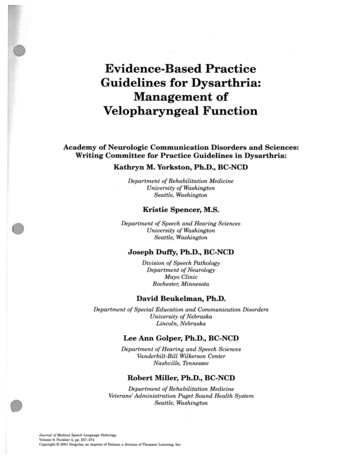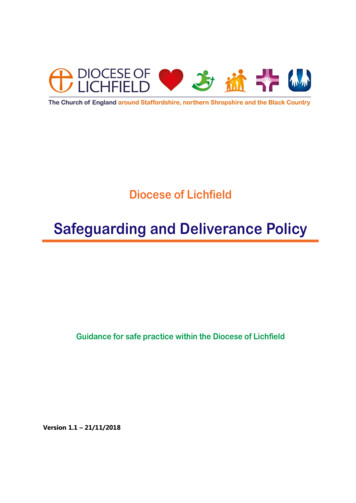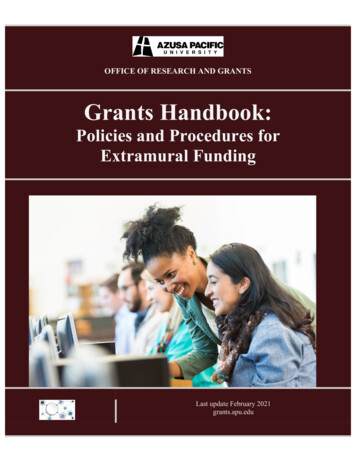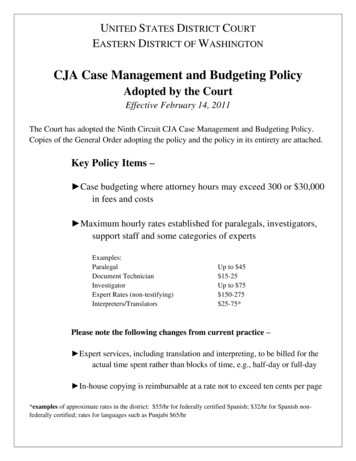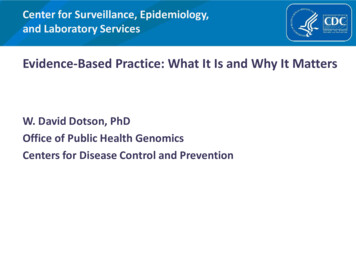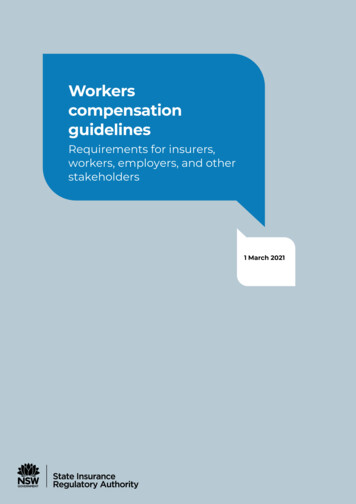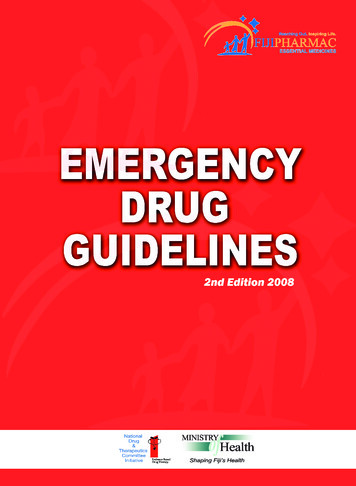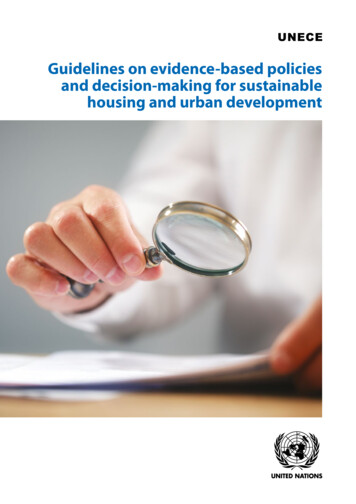
Transcription
Guidelines on evidence-based policiesand decision-making for sustainablehousing and urban development
ECE/HBP/203UNITED NATIONS ECONOMIC COMMISSION FOR EUROPEGuidelines on evidence-basedpolicies and decision-making forsustainable housing and urbandevelopmentGeneva, 2020
GUIDELINES ON EVIDENCE-BASED POLICIES AND DECISION-MAKING FOR SUSTAINABLE HOUSING AND URBAN DEVELOPMENT 2020 United NationsAll rights reserved worldwideRequests to reproduce excerpts or to photocopy should be addressed to the Copyright Clearance Center at copyright.com.All other queries on rights and licenses, including subsidiary rights,should be addressed to: United Nations Publications,405 East 42nd Street, S-09FW001, New York, NY 10017, United States of America.Email: permissions@un.org; website: https://shop.un.orgThe findings, interpretations, and conclusions expressed herein are those of the author(s) and do not necessarily reflect theviews of the United Nations or its officials or Member States.This publication is issued in English and Russian.United Nations publication issued by the Economic Commission for Europe (UNECE)ECE/HBP/203ISBN 978-92-1-117247-8eISBN 978-92-1-005117-0Sales No. E.20.II.E.332
ACKNOWLEDGEMENTSACKNOWLEDGEMENTSThis Guidelines document is the result of a joint effort of the United Nations Economic Commission for Europe (UNECE)and the United Nations Human Settlements Programme (UN-Habitat).The UNECE and UN-Habitat secretariats wish to acknowledge Agata Krause, UN-Habitat/UNECE consultant, for drafting theguidelines. The following staff of the UNECE and UN-Habitat secretariats contributed to the production of this publication:from UNECE - Gulnara Roll, Secretary to the Committee on Urban Development, Housing and Land Management, Ms. PaolaDeda, Director of the Forests, Land and Housing Division and Cecilia Batac; and from UN-Habitat - Fernanda Lonardoni,Emile Rolland, Giulia Lavagna, Ryan Macauley, Mr. Robert Ndugwa and Christophe Lalande, Head of Housing Unit.The UNECE and UN-Habitat secretariats would also like to acknowledge the experts and Matteo Tarantino, Lecturer andSenior Research Associate, from the University of Geneva for their contributions to the study and thank other experts forthe peer-review, and valuable input and comments.We would like to express our gratitude to representatives of the following European Union institutions for providinginput to the guidelines: the Committee of the Regions, the Directorate General for Regional and Urban Policy, Eurostat,the Directorate General Joint Research Centre and the EU Parliament.3
GUIDELINES ON EVIDENCE-BASED POLICIES AND DECISION-MAKING FOR SUSTAINABLE HOUSING AND URBAN DEVELOPMENTCONTENTSAcknowledgements. 3Executive Summary. 7Introduction 11Policy context . 11About the Guidelines. 12Approach, definitions and scope of the guidelines. 13Development and use of the guidelines. 13Chapter 1Producing data for sustainable housing and urban development policies . 17Main data producers and sources . 17Housing and Population Census. 18Household surveys. 19Registers and administrative data. 19Local data producers and sources . 20Other data sources and new data. 21Big data. 22Geospatial data. 23People-generated data . 24Chapter 2Developing evidence for sustainable housing and urban development policies. 27Leaving no one behind. 27Gender. 28Age. 28Income. 29Disability. 30Migratory status. 30Geographical location . 31Data analysis methodologies and methods. 32Improving data analysis . 324
CONTENTSChapter 3Informing housing and urban development policy and decision-making. 35Using the global and regional set of indicators . 35Key Performance Indicators for Smart Sustainable Cities. 36City Prosperity Indicators. 37Focusing on the past and the future. 38Bottom lines in evidence-based policymaking . 39Embracing the universal character of housing. 39Evidence-based policymaking as a collective process. 40Learning from elsewhere . 40Benchmarking of urban development. 41Recommendations. 42Annexes 47Annex 1 SDG 11 targets and indicators. 47Annex 2Housing-related targets and indicators in the global SDG framework. 49Annex 3Definitions of selected EU indicators. 50Annex 4 Selected housing indicators in global and regional development frameworks. 51Annex 5Development Agendas and monitoring frameworks at the EU level. 52Annex 6 Selected global and regional databases and their strengths. 53Annex Typology of data for sustainable housing policies based on the Geneva UN Charteron Sustainable Housing 55Annex 8 Contribution of the qualitative and quantitative data to evidence-based housingand urban development policies 56Sources 57List of boxesBox 1. CBS Urban Data Centres. 20Box 2. Counting rough sleepers in Barcelona . 21Box 3. Digitalization as an opportunity and challenge for housing policy . 22Box 4. Challenges in the use of big data. 23Box 5. Measuring at the city scale. 31Box 6. Institutional siloing as a challenge for evidence-based housing and urban development policies. 405
EXECUTIVE SUMMARYEXECUTIVE SUMMARYCountries and cities in the UNECE region face diverse urban development challenges: uncontrolled urbanization, urbansprawl, informal development, homelessness, climate change and environmental pollution, and providing access to urbaninfrastructure and services, most notably to adequate and affordable housing for all. The situation becomes particularlychallenging in light of emergency situations such as earthquakes, floods and most recently, the spread of the COVID-19virus in countries and cities in the UNECE region. Despite considerable efforts made by governments of UNECE countriesto develop policies, projects and programmes, and to build partnerships addressing these issues, multiple challengesremain.There is a common understanding among policymakers, practitioners and scholars that the lack of reliable data andevidence and the insufficient capacity of governments to use this data constrain opportunities to develop adequate policyresponses and are the key reasons why many policies fail to induce a tangible change and improve urban environments.The effect of this is that progress towards achieving the Sustainable Development Goals (SDGs), especially SDG 11: “Makecities and human settlements inclusive, safe, resilient and sustainable”, in the UNECE region remains limited and this is whyestablishing better standards for the production, management and use of data and evidence in policymaking is one ofthe priority tasks under the 2030 Agenda for Sustainable Development (2030 Agenda) to ensure its timely implementation.The guidelines in this document (Guidelines) aim to support the efforts of governments in the UNECE region to improveevidence-based policymaking on sustainable urban development and housing. They inform discussions that took placeduring the national workshops conducted within the United Nations Development Account (UNDA) tenth trancheproject: “Evidence-based policies for sustainable housing and urban development in selected countries with economiesin transition”, which demonstrated that national, regional and local governments, in addition to other stakeholders in theUNECE region, (i) require further support to develop national and local sets of indicators for monitoring and implementingsustainable housing and urban development policies and the SDGs and (ii) need to improve production, managementand use of evidence in the policy processes and decision-making for sustainable urban development.With a view to improving the implementation and review of the 2030 Agenda at all levels of governance and achievingthe SDGs, especially SDG 11, as well as the implementation of the Geneva UN Charter on Sustainable Housing and otherinternational agreements, the Guidelines:(a) Capture the diversity of ongoing activities of policymakers at national and local levels and other stakeholders inthe UNECE region to develop evidence-based policies on sustainable urban development with a focus on housing;(b) Present the benefits of deploying evidence-based approach(es) to policymaking in relation to the production/collection of data and the development of evidence and decision-making, in the context of national, regional andlocal development agendas;(c) Demonstrate the application of various policy approaches (frameworks, methodologies, and other tools) intopractice, in order to improve the review and to reinforce the efforts in meeting SDG 11 and other urban relatedtargets in the UNECE region.This document serves as a practical reference for policymakers and for other experts involved in the development, reviewand implementation of policies on sustainable housing and urban development at all levels of governance. The Guidelinescan be used at all stages of policy development – from agenda setting and policy formulation to implementation/reviewand evaluation.The Guidelines refer to the UNECE region, where the UNDA project has been implemented since 2016. However, thedocument and its recommendations also apply to countries outside the UNECE region.Implementation of the 2030 Agenda requires taking a broad view of housing and urban issues and applying a strategicapproach to addressing them. This requires policymakers to develop, implement and review approaches to the productionof data, and developing evidence and decision-making, in order to ensure rigour in the policy process and that policydecisions are well targeted and proportional.7
GUIDELINES ON EVIDENCE-BASED POLICIES AND DECISION-MAKING FOR SUSTAINABLE HOUSING AND URBAN DEVELOPMENTIn recognition of the growing importance of data in policymaking and with a view to improve the review andimplementation of the 2030 Agenda in the UNECE region, the Guidelines document (i) outlines selected challenges andopportunities for evidence-based policymaking in the UNECE region; (ii) provides examples of the ongoing activities toinform the review and implementation of the 2030 Agenda in the UNECE region; and (iii) demonstrates the benefits ofapplying selected approaches to evidence-based policymaking.The introduction recognizes that the efforts of policymakers to effectively address urban development challenges,such as the limited supply of decent quality affordable housing, are hindered by a range of factors, including insufficientcapacities to carry out collection and analysis of data in a comprehensive and timely manner, and insufficientcoordination between and among data producers and data users in the process. It therefore emphasizes that the2030 Agenda envisages a new, more rigorous approach to policy development and implementation and encouragesdecision makers to embrace opportunities stemming from the “data revolution”, while also ensuring that “no one is leftbehind”. The chapter explains the meaning attributed to “data”, “evidence” and “evidence-based policymaking” in theGuidelines.Chapter one considers the role of data in evidence-based policymaking. It indicates how to acquire/collect high qualitydata for sustainable housing and urban development policies. It maps key data providers and mainstream sources ofdata for sustainable housing and urban development policies, especially the housing and population censuses andhousehold surveys. It portrays how the data revolution, including the rise of “big data”, “geospatial information”, “citizendata” and private sector data, have changed the landscape of production and governance of data in UNECE countries.The chapter outlines opportunities stemming from collaborative data production and the value of “data collaboratives”to improve the production of urban data in view of the limited capacities of public budgets; and to ensure that thedata and evidence used in decision-making processes is credible and relevant to housing and urban challenges “onthe ground”.Chapter two describes how data becomes evidence and multiple ways of ensuring that evidence used in policydevelopment and decision-making is high quality and relevant. It demonstrates how to implement the key values of the2030 Agenda into an evidence-based policy process. The chapter highlights why and how policymakers should carry outdata analysis so that “no one is left behind” and flags the importance of disaggregating data per gender, age, ethnicity,income, disability and migratory status. The chapter finally stresses that quality assurance is one of preconditions forcrafting reliable evidence and designing an indicator set.Chapter three focuses on how data and evidence should be used to inform sustainable housing and urban developmentpolicies to ensure the highest reliability and accuracy of policy responses to housing challenges in countries and citiesin the UNECE region. It points to the role of comprehensive approaches to decision-making in relation to housing andurban development. It concerns for instance the use of Key Performance Indicators for Smart and Sustainable Cities(KPI4SSC) to produce data for sustainable housing and urban development policies and to guide decision-making; or therole of “in advance” approaches to the production of data and decision-making, especially foresight and scenario-basedmethodologies, integrated sustainability assessment and regulatory impact assessments.Last but not least, the chapter concludes that evidence-based policymaking for sustainable housing and urbandevelopment requires a “universal” and collaborative approach to policy process and decision-making and also embracingthe challenges and opportunities stemming from international “policy transfer”.This Guidelines document provides a range of recommendations, with a view to improve evidence-based policymakingfor sustainable housing and urban development in the UNECE region and to ensure the alignment of housing and urbandevelopment policies with the 2030 Agenda. It flags the importance of improving policy coherence, and better aligningpolicy initiatives and the corresponding review mechanisms to the review of the implementation of the 2030 Agenda.Its recommendations highlight the need for policymakers to ensure an integrated and coordinated approach to theimplementation of the 2030 Agenda and monitoring progress towards SDGS, with the participation of all relevantstakeholders at the global, regional, national, subnational, sub-regional, and local levels. This document also recommendsgovernments to be aware of the emerging reporting requirements resulting from the implementation of the 2030 Agendain their country and to promote this across the institutional spectrum.8
EXECUTIVE SUMMARYThe Guidelines emphasize the importance of data to develop policies for sustainable housing and urban developmentand to monitor progress towards SDGs. The production of high-quality and relevant policies and successful reportingon SDGs require improving the capacities of urban data producers, openness in data sharing and transparencyin the use of data in policy responses. This highlights the need to improve the capacities of national statisticaloffices (NSOs) in the UNECE region to produce timely urban data, as well as to improve cooperation with otherorganizations and agencies comprising national statistical systems in UNECE countries to leverage considerableamount of data for policymaking. Furthermore, as cities play active role in the realization of the 2030 Agenda, it isessential: to promote the initiatives of measuring progress towards sustainable development at the local level, tosupport local data production, and to explore the use of non-statistical and administrative indicators in the reviewof implementation of the 2030 Agenda and in the development of evidence-based policies. This concerns especiallythe use of already existing global standards to evaluate the performance of cities (communicate outcomes in theprocess), such as the KPI4SSC.Policymakers should consider making various types of data publicly available, which provides an additional measureto verify accuracy and relevance of data, and evidence used in policy process and decision-making. However,improving openness of data and developing partnerships with private sector organizations should ensure dataprivacy and anonymity while keeping the Government, private sector organizations and/or other stakeholdersinvolved in the process accountable for data handling at the same time.The complex nature of housing and urban development challenges and their solutions require understandingin order to effectively address them. Policymakers should ensure a comprehensive approach to evidence-basedpolicymaking and decision-making with an intent to maximise the potential of data in the policy process andimprove the quality and reliability of policy proposals. Better recognition of the “externalities” of policy interventions,e.g. their positive and negative “effects”, is required to improve the quality of evidence-based policy process. Theprocess involves producing/acquiring data and developing evidence that corresponds to the outcomes and effectsof policy interventions in relation to various aspects of urban life; and whenever appropriate, at various scales –regional, national and supra-national. Integrated and comprehensive methodologies, frameworks and other toolsshould be used better to assess the complex impacts of housing and urban interventions, and to help designadequate proposals of future policies, programmes and projects.Just as importantly, this document emphasizes that effective policy interventions should be impartial and objective.In this regard, it is important to consider the following: i) breaking the “silo mentality” in connection with housingand urban policies is important (increasing the pace of building houses without consideration of environmentalstandards and urban planning cannot successfully improve access to decent quality, affordable housing); ii) theeffective use of impact assessments and integrated sustainability assessments, including foresight, to makedecision-making more forward-looking and to improve management of risks resulting from adverse effects ofpolicy initiatives; iii) sharing knowledge and “good practices” regarding available policy instruments and policy toolsfor the review of SDG 11 and other housing and urban-related targets; and iv) communicating policy initiatives tothe general public in a clear, transparent manner, using the best available tools and removing technical, cultural andeconomic access barriers, as much as possible.9
INTRODUCTIONINTRODUCTIONPolicy contextCountries and cities in the UNECE region face diversechallenges: uncontrolled urbanization, urban sprawl,informal development, homelessness, climate change andenvironmental pollution, outdated urban infrastructure,fuel poverty, and most notably, limited access to adequateand affordable housing for all. Policymakers makeconsiderable efforts to address these issues by generatingpolicies, projects and programmes that are based on thebest available data, the most reliable evidence and toensure such initiatives are delivered in a timely manner.However, considering the limited capacities of dataproducers and data analysis and the challenges of interand intra-institutional coordination, the implementationof evidence-based sustainable housing and urbandevelopment policies remains a challenge.Over the last decade, housing has become an increasinglymore important subject of public debate. Housingmarket dynamics triggered the global financial crisis,the legacy of which is still alive. Growing social andeconomic inequalities in cities, the development ofinformal settlements and slums on the one side, andgated communities on the other side, as well as the everincreasing costs of urban interventions, have demandedfurther action from policymakers and induced globalpolicy responses including the introduction of the Rightto Adequate Housing, in the context of the Habitat Agenda(1996). Housing has been placed at the centre of the2030 Agenda, the New Urban Agenda, and the GenevaUN Charter on Sustainable Housing.The Right to Adequate Housing and the Geneva UN Charterfor Sustainable Housing point out that the access to decentquality and affordable housing for all is a precondition forimproving quality of life, social cohesion, and increasingthe pace of economically viable and green growth ofcountries in cities. The 2030 Agenda emphasizes thatlimited access to affordable housing, uncontrolled urbansprawl and growing urban slum populations are globalproblems. In addition, the SDG 11 addresses a need toimprove urban environments by creating smart, safe andefficient urban transport systems. The recently enactedNew Urban Agenda focuses on enabling policymakers todevelop and put into action evidence-based sustainablehousing and urban development policies.The transversal values of the 2030 Agenda and thecommitment to its realization has been embraced bythe European Union (EU) institutions, as sustainabledevelopment is a fundamental objective of the EU in theTreaty of Amsterdam established in 1997. Despite nothaving any specific mandate regarding housing, landmanagement and urban planning, the EU institutionsinfluence the development of housing and urban policiesin the EU member states. They concern, for instance, theEU regulations on energy efficiency, the State Aid rules,the Urban Agenda for the EU, the European Pillar of SocialRights, and the corresponding mechanisms, funding,international cooperation, international aid programmesand many others.Policymakers in the UNECE region have recognised thatimplementation of the 2030 Agenda is limited by theavailability of reliable data and inefficient data processing.Establishing better standards for the production/collection and use of data and evidence was thereforediscussed in the United Nations Millennium DevelopmentGoals (MDGs) and the SDGs1 of the 2030 Agenda.The MDGs emphasized the importance of gathering andmonitoring data in order to achieve the Goals, they alsoput forward objectives to strengthen the use of data indecision-making in order to generate more targetedpolicy responses.2 The MDGs, however: (i) focused onlyon developing countries and were not of an immediateinterest to more developed countries; (ii) centred datacollection at the national level, while housing and urbandevelopment are in many countries managed by localauthorities; and (iii) did not specifically focus on genderand indigenous groups in relation to data collectionand analysis (data on these groups of population wasnot collected by some NSO
ACKNOWLEDGEMENTS This Guidelines document is the result of a joint effort of the United Nations Economic Commission for Europe (UNECE) and the United Nations Human Settlements Programme (UN-Habitat).


